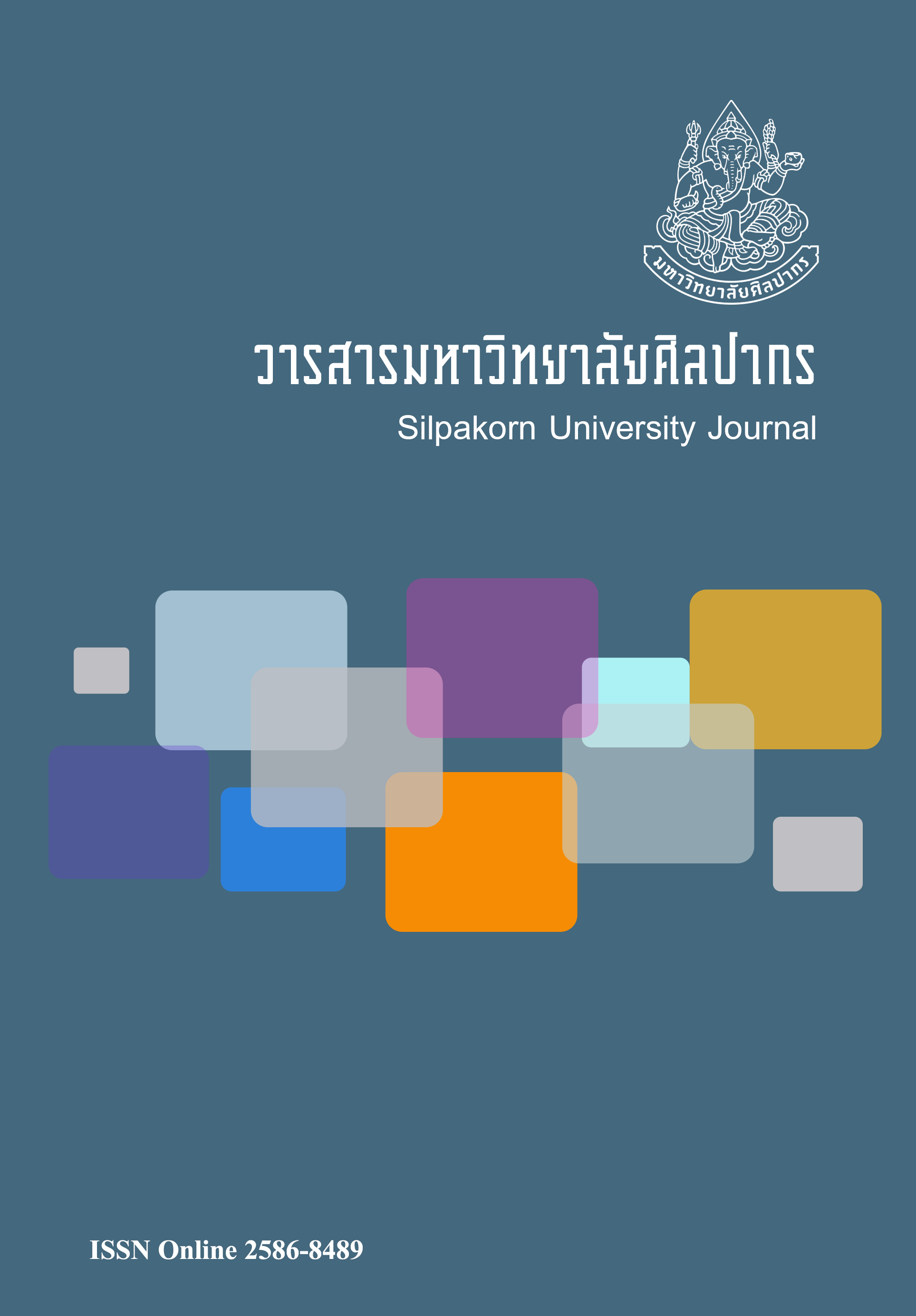ปัจจัยที่มีผลต่อความอยากเรียนของผู้เรียนวิชาภาษาญี่ปุ่น คณะอักษรศาสตร์ มหาวิทยาลัยศิลปากร (Factors in motivation to learn Japanese language of students taking Japanese course at the Faculty of Arts, Silpakorn University)
Main Article Content
Abstract
การวิจัยครั้งนี้มีวัตถุประสงค์ 1) เพื่อศึกษาเปรียบเทียบปัจจัยที่มีผลต่อความอยากเรียนของนักศึกษากลุ่มเคยเรียนแผนกศิลป์ภาษาญี่ปุ่นในระดับมัธยมศึกษาตอนปลายกับนักศึกษากลุ่มที่ไม่เคยเรียนในแผนกศิลป์ภาษาญี่ปุ่น ทั้งปัจจัยทางบวกได้แก่ ปัจจัยที่ทำให้อยากเรียนภาษาญี่ปุ่นมากขึ้น หรือรักษาระดับความอยากเรียนเอาไว้ได้ และปัจจัยทางลบได้แก่ ปัจจัยที่มีผลให้ความอยากเรียนลดต่ำลง 2) ศึกษาเปรียบเทียบช่วงเวลาและสาเหตุที่ทำให้รู้สึกว่าความอยากเรียนลดต่ำลงของทั้งของผู้ที่เคยเรียนและไม่เคยเรียน 3) ศึกษาเปรียบเทียบวิธีสร้างแรงจูงใจขึ้นมาใหม่ของผู้เรียนทั้งสองกลุ่ม โดยกลุ่มตัวอย่าง คือ นักศึกษาชั้นปีที่ 1-5 คณะอักษรศาสตร์ มหาวิทยาลัยศิลปากร ที่เรียนภาษาญี่ปุ่นในภาคการศึกษาที่ 2 ปีการศึกษา 2559 รวมทั้งสิ้น 284 คน โดยแบ่งเป็น กลุ่มเคยเรียนในแผนกศิลป์ภาษาญี่ปุ่น (J1) 153 คน และกลุ่มไม่เคยเรียนในแผนกศิลป์ภาษาญี่ปุ่น (J2) 131 คน ผู้วิจัยได้ใช้แบบสอบถามเป็นเครื่องมือในการเก็บรวบรวมข้อมูล ผลการวิจัยสรุปได้ดังนี้ 1) เรื่องระดับความอยากเรียนของทั้ง 2 กลุ่มพบว่า จำนวนของผู้ที่อยากเรียนเพิ่มขึ้น เท่าเดิม หรือท้อถอยนั้นมีจำนวนพอๆ กันทั้งหมด อาจสรุปได้ว่า ประสบการณ์ในการเรียนนั้นไม่มีผลต่อความอยากเรียนจนแตกต่างกันอย่างมีนัยสำคัญทางสถิติ ส่วนปัจจัยที่ทำให้กลุ่ม J1 มีความต้องการเรียนภาษาญี่ปุ่นเพิ่มขึ้น คือ มีบุคคลที่ประสบความสำเร็จ บุคคลที่ตนเองนับถือ หรือชื่นชอบ รวมถึงการมีคู่แข่ง ส่วนกลุ่ม J2 จะให้ความสำคัญกับปัจจัยภายในจิตใจของตนเองอย่างเช่น ความรู้สึกภูมิใจ ความสนุกในการเรียน หรือความไม่พอใจในความสามารถของตัวเองเป็นตัวกระตุ้น ให้รู้สึกอยากเรียนภาษาญี่ปุ่นเพิ่มขึ้น ส่วนปัจจัยที่ส่งผลให้ความรู้สึกต้องการเรียน ลดน้อยลงระหว่างกลุ่ม J1 และกลุ่ม J2 คล้ายคลึงกัน คือ ปัจจัยที่ส่งผลทำให้รู้สึกท้อถอยในการเรียนมากที่สุด คือ ปัจจัยด้านศักยภาพในการเรียน ในเรื่องความไม่มั่นใจในความสามารถของตนเอง ส่วนปัจจัยที่เกี่ยวข้องกับความรู้สึกท้อถอยน้อยที่สุด คือ ปัจจัยด้านสภาพแวดล้อมในการเรียน เรื่องปัญหากับเพื่อนในชั้นเรียน 2) กลุ่มนักศึกษา J1 จะรู้สึกท้อถอยในช่วงแรกมากกว่ากลุ่มนักศึกษา J2 สาเหตุเกิดจากการเปรียบเทียบกับ การเรียนในชั้นมัธยมศึกษาตอนปลายของตนเอง 3) นักศึกษาทั้งสองกลุ่มมีวิธีรับมือ เมื่อรู้สึกท้อถอย หรืออยากเรียนลดน้อยลงคล้ายๆ กัน คือ พยายามคิดถึงแรงบันดาลใจตอนเริ่มเรียนของตนเอง สำหรับกลุ่มนักศึกษาที่ไม่มีประสบการณ์ในการเรียน ภาษาญี่ปุ่นมาก่อน จะมีแนวโน้มใช้วิธีรับมือด้วยการออกห่างจากภาษาญี่ปุ่นสักพัก โดยหันไปทำกิจกรรมหรืองานอดิเรกอย่างอื่นมากกว่า
The objective of this study is to investigate the motivation of Japanese language learners and explore the related issues that are likely to influence the learning process by finding out the factors that motivate or demotivate them. A survey using open-ended questionnaires was conducted to two groups of students based on their Japanese language learning experience, namely the students who graduated from Japanese language program in high school (hereinafter referred to as J1) and those who have never been in Japanese language program in high school (hereinafter referred to as J2). A total number of 284 students (153 students of J1 and 131 students of J2) who were first to fifth year students taking Japanese courses at Faculty of Arts, Silpakorn University in the 2015 academic year participated this survey. The results of the study are as follows. 1) The important factors which increase motivation of J1 are successful individuals, ideal persons, also their rivals, where J2 focuses more on the internal factors such as proudness, the enjoyment in class, and the unsatisfactory in their own skills. The factors that demotivate both groups on studying Japanese are similar. Their class performance and the lack of confidence in their own skills are the most influential factors, while class environment and peer problems are the least influential. 2) J1 seems reluctant to study Japanese at the first and second year much more than J2 because they tend to compare the class with their previous learning experience in high school. 3) To rebuild their motivation, both groups of students try to revive their motivation when they started learning Japanese. Although the results indicate that J2 tend to rebuilt the motivation by stepping back from learning Japanese much more than J1.
Downloads
Article Details
References
Santisirisoomboon, J. (2012). The Study of Factors Affecting Classroom Attendance in Air, Noise Pollution and Control (ENV3301) (การศึกษาปัจจัยที่ส่งผลต่อการเข้าชั้นเรียนของนักศึกษากระบวนวิชา ENV3301
มลภาวะอากาศ เสียง และการควบคุม). Reseach report. Ramkhamhaeng University Knowledge Management. Retrieved June 15, 2016 from http://www3.ru.ac.th/KM-Research/index.php/km/viewIndex/22.pdf
Tomiyoshi, Y. (2014). Qualitative Survey on Factors Influencing Learning Motivation of Japanese Language Students: In the Context Surrounding Japanese Major Students in Central Thai University P in Thailand
(日本語学習意欲に影響を与える要因に関する質的研究 : タイ中 部P大学 の日本語主専攻者を取り巻く文脈において).Obirin Gengo Kyoiku Ronso, 10: 39-54.
Yamamoto, A. (2015). Changes in Motivation in Japanese Language Learners and Their Factors: Focusing on Japanese Language Training at Indonesia before Coming to Japan (日本語学習者 の意欲の変化と
その要因 : インドネシアにおける渡日前日本語研修の事例よ
り). Doctoral Dissertation, Takushoku University, Tokyo, Japan.
Yoshikawa, K. (2011). The Relationship between Factors in Increasing Motivations to Learn Japanese Language and Learning Action at Secondary Schools in Thailand: Factors in Intrinsic Motivation while Teaching Japanese
Language (タイ中等教育における日本語学習意欲を高める要因と学習行動 との関係- 日本語教師の日本語指導時の内容的動機づけ要因). The Japanese Education Bulletin of Bangkok JapaneseCultural Center, Japan Foundation, 8: 75-84.
Yoshikawa, K. (2013). Factors in Increasing Motivation to Learn Japanese Language at Secondary Schools in Thailand: a Comparison between a Group Increasing Japanese Learning Behavior and the Others (タイ中等教育における日本語学習動機,学習意欲を高める要因 : 日本語学習行動 増加群と減小の比較). The Japanese Education Bulletin of Bangkok Japanese Cultural Center, Japan Foundation, 10: 117-126.


